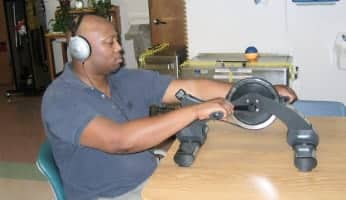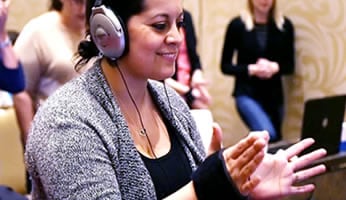Featured in Specialneeds.com: Interactive Metronome Hits the Right Beat!

Home - Testimonials - Pediatric Testimonials - Featured in Specialneeds.com: Interactive Metronome Hits the Right Beat!

Interactive Metronome Hits the Right Beat
Three and a half years ago, Diane Solomon was at the end of her rope. Her son Adam was in second grade and nobody knew what was wrong with him. When Adam was 18 months old, he had been diagnosed with a rare childhood inflammatory disease called Kawasaki syndrome. After six months he improved, but he had sensitivities they later learned were sensory integration problems. When Adam was five, he became a one in two million kid and got Kawasaki syndrome a second time, this time ending up with a coronary aneurysm. When he recovered, he couldn’t hold a pencil for six months. Diane says they started him in school, but they soon realized something else was wrong.
“He couldn’t pay attention for more than five seconds,” Diane recalls. “Whenever the teacher called for everyone to line up for snacks, my son was still sitting there. He didn’t even know anyone had left.” Other children did not want to be around Adam because his motor skills were so severe and he could not understand the rituals of kindergarten. “They didn’t want to play with him because he didn’t know how to play,” says Diane. She and her husband saw moments of brilliance in Adam, but they saw some OCD, too. The pediatrician said he was “quirky” and recommended that Adam see a psychiatrist. The psychiatrist thought he might have ADD and wanted to put him on medication, but they couldn’t because that would speed up his brain and his heart and he already had an aneurysm. Diane demanded that Adam be given a CAT scan to see if he had a tumor. Nothing was wrong.

By the time he got to second grade, Adam’s desk was five inches lower than the other kids’. He had to sit in a corner. Things were taped all around desk in case something rolled onto the floor, because if it did he would spend five minutes looking for it. He sat on a ball instead of a chair, with the hopes that it could help him. Diane remembers walking into the classroom and bursting into tears because Adam looked like a child who belonged in special education. She thought, “My God, what’s going to happen to him?”
Adam was in pull-outs for four hours every day at school. He was getting occupational therapy. By the end of second grade, Adam was reading at a kindergarten level and he never passed math. He could not even ride a bike or walk up the stairs one foot in front of the other. His parents began to wonder, “Will he ever be able to live alone? Will he be able to take care of himself?”
At this point, Diane learned about something called Interactive Metronome from a co-worker whose child had used it. Interactive Metronome (IM) is a computer-based program that helps people with a variety of conditions affecting their cognitive and physical abilities. It has a game-like interface that appeals to kids and makes training with IM fun. Those who participate in training are challenged to synchronize hand and foot exercises to a rhythmic beat that plays through headphones. They get real-time feedback as their scores are logged into the computer after each session.
Diane had no idea that Interactive Metronome would prove to be life changing, not only for Adam but for her whole family. Adam began training with in-home IM provider Sherrie Hardy in June of 2008 and continued all through the summer. He began with his brain timing being 400 milliseconds off the beat, and by the end of the summer he was only 70 ms off the beat, which is in the average to above-average range. Other things began to click for Diane: “He was a chronic bed wetter for as long as I could remember who stopped wetting the bed two weeks into training.” Transitions also became easier.
In the beginning of third grade, Diane received a phone call from Adam’s new teacher who wanted to know why he was in pull-outs four hours a day. Diana started to apologize and explain that she had meant to talk to the teacher about all of Adam’s problems. The teacher told her that based on the beginning of the year exams, Adam was at third grade level in everything. Diana fell off her chair. “My son had grown three grade levels over the summer.” His reading lexicon had doubled.
Adam himself talks about what happened to him: “I never knew anything was wrong with my brain timing until third grade. It really did help me. If it wasn’t for metronome, I don’t know what I’d be doing right now. I just can’t imagine it.” Adam can’t even recall what life was like before he started training. “I had no idea what I was doing when they first told me to clap my hands,” he says. “I didn’t know any of this was happening to me until third grade.”
One thing he does remember is the day he got the news he was no longer required to be in special education. “When I was in third grade, around the middle of the year, my name was called on the PA to proceed to the front office, and I just knew what was going to happen,” he recalls. “I went up there with a smile on my face. I went inside this room in the office. In there was my RSP teacher, my OT teacher, my third grade teacher, my mom was there, and the principal and assistant principal. They said I no longer qualify for special education because I didn’t test in the average range. I tested in the superior range.”
Now Adam helps Sherrie Hardy with her other clients. He gives them advice about training, telling them to “imagine like it’s a video game and you’re trying to get to the next level.” He tells them the story of what happened to him. “After the first few months of metronome, they’ll show a lot of progress,” he says. “That’s what happened with me.” Diane says the change in her son is so profound that she now volunteers all her free time, almost equal to a full-time job, to helping Sherrie and getting the word out about Interactive Metronome.
As for Adam, he loves school, especially science. He wants to be a doctor or a scientist some day. He’s in the gifted program, “an expert clarinet player” in the school band, a member of the chess club and the boy scouts, and is learning to read and speak Hebrew. “I’m just really happy,” he says, “I wanted to be like everyone else.”
As Diane says, “We just wanted him to fit in. We just wanted him to be average and have a happy life. What we didn’t know was he had a high IQ, but he had this cloud over him. The Interactive Metronome product lifted that cloud and let him be who he really is.”
Read the story in the original source here: SpecialNeeds.com





